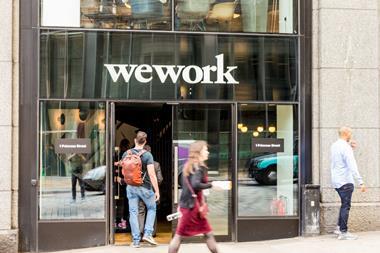Liz Hamson’s piece last week on great places to work reminded me of a conversation I had recently with a group of industry colleagues about WeWork. Was it likely to IPO at a huge price or was it actually bound to crash and burn? Frankly my dear, I don’t give a damn.

The real point surely is that WeWork, successful or not, stands for some very important strands in the way business is conducted in this second decade of the 21st century.
Firstly, WeWork really does care about the customer experience. To be sure, some of it has slightly missed the target. All that free beer turns out not to have been such a good idea. Micro roasted coffee, fresh fruit water and bike storage may or may not float your boat, but the underlying message is: we really want you to like your workplace. How many employers think that way these days?
WeWork also recognises that quite apart from its offering being ideal for start-ups, businesses of all sizes know the world is changing so rapidly that in a couple of years’ time they might want half as much or half as much again of the space they currently occupy.

Flexibility driven by technology is the key to the future of the workplace. ‘Work on the pause’ is the technical description of a world in which I can work as easily from home as from a coffee shop or an airport lounge or sitting on a train as I can at a row of desks overseen by my boss watching me watch the clock.
First we had home working but that rapidly fell out of favour with employees who after the initial euphoria of being able to pen that telling piece in their pyjamas soon got bored staring at the same four walls every day and ended up killing the kids. OK, I made that last bit up, but in reality there is little serious full-time home working these days.
Flexibility, however, turns out to be very popular indeed with employers and employees alike. For employees it has the advantage of being there when they need to be for the family, while employers know that the biggest cost to their business is people and the second-biggest cost is housing them.
Flexibility turns out to be very popular indeed with employers and employees alike
It also has a profound impact on the way we all in one form or another arbitrage the cost of our mortgage and our travel to work. The London travel-to-work area now extends to Norwich, Bristol, Birmingham and up the East Coast Main Line as far as Newark in Lincolnshire where a four-bed detached house with gardens front and back, in an attractive village with clean air and decent schools, is yours for £320,000.
Season ticket sales down
Couple that with the flexibility that nearly all of the top companies on the Best Places to Work in Property list offered and the result is that we now sell fewer season tickets than we used to because three days are in the office and two are at home. The travelcard in London that offered 10 trips for the price of nine that we all used to buy no longer sells in as great numbers and the night on which most Londoners leave for the weekend is now Thursday, not Friday.
These are real and permanent changes to the way we work and the implications for developers, transport operators and city managers are profound. We ignore the WeWork revolution at our peril, whether that company survives or not. Gone are the days of the 40-hour week, the 25-year lease and the easy assessment of yield for commercial investors. Like many first movers, being first may end in tears for WeWork. But like most brave or even foolhardy explorers, its efforts will inevitably pave the way for those that come after.
Steve Norris is chairman of Soho Estates and This Land






























1 Readers' comment